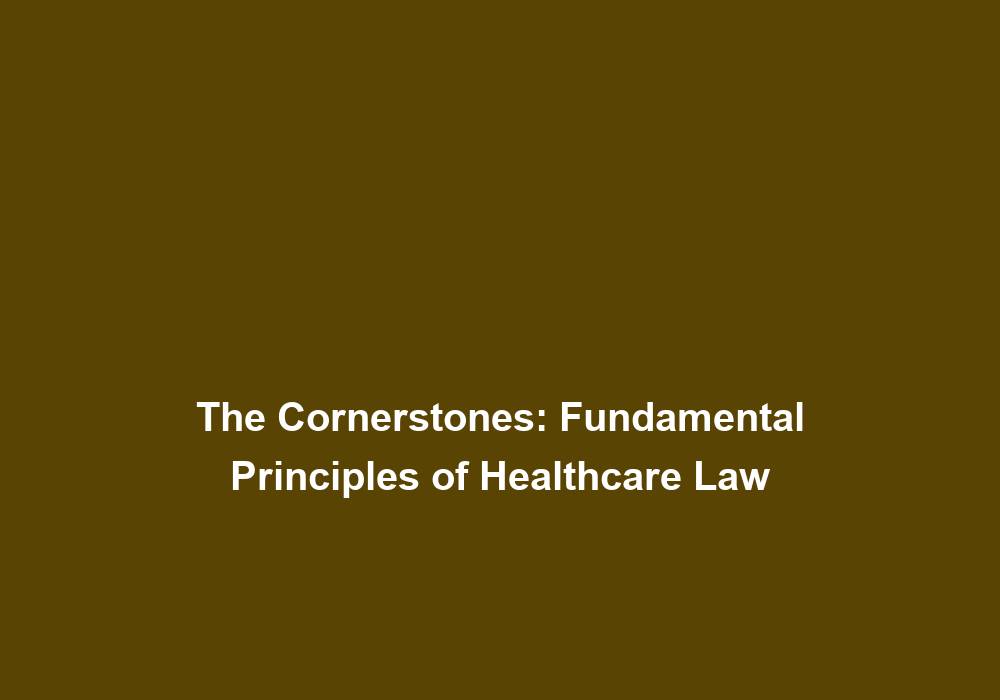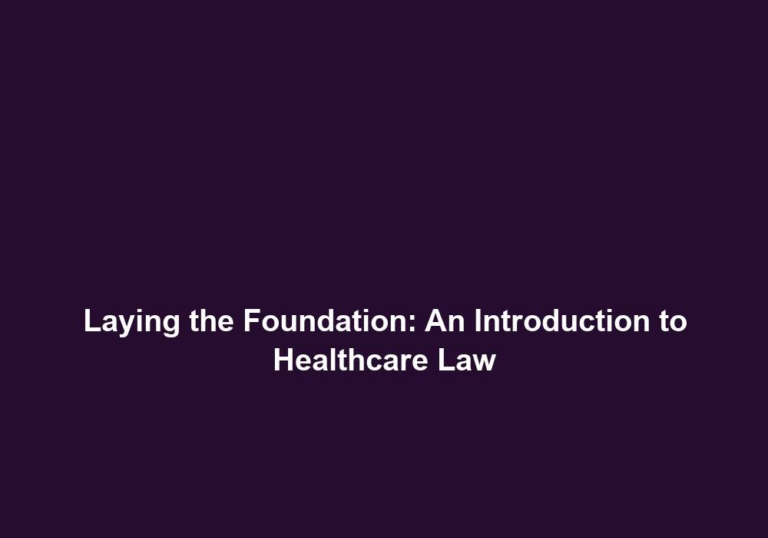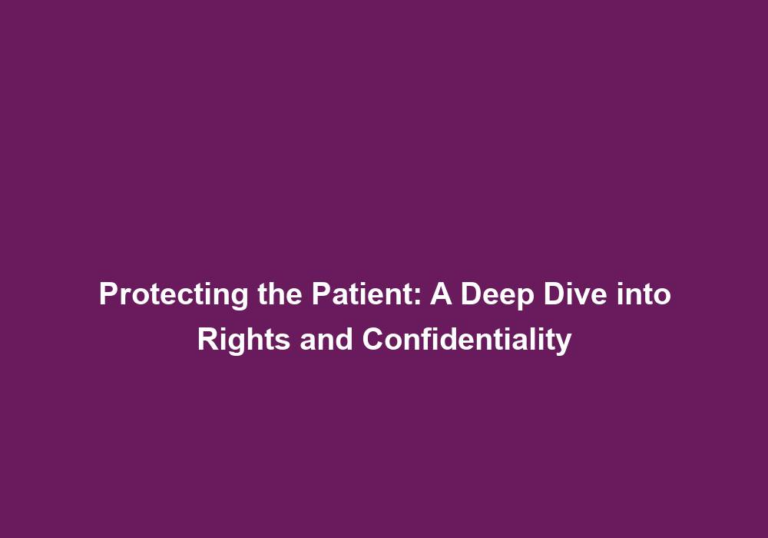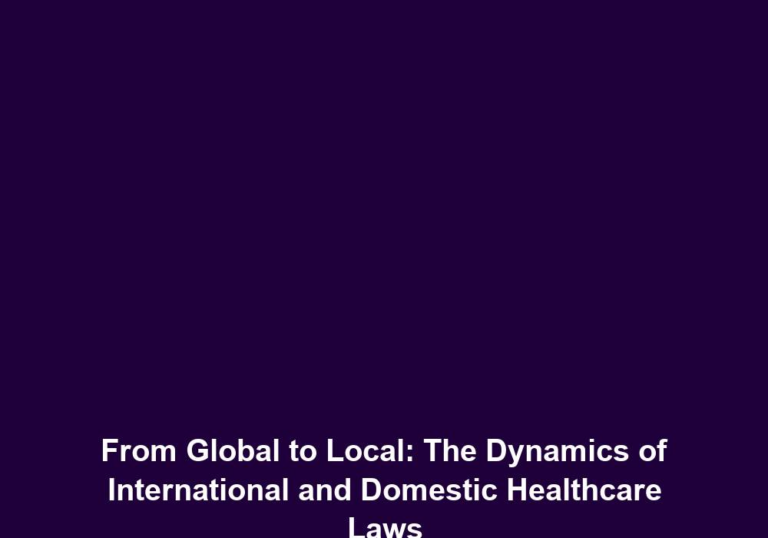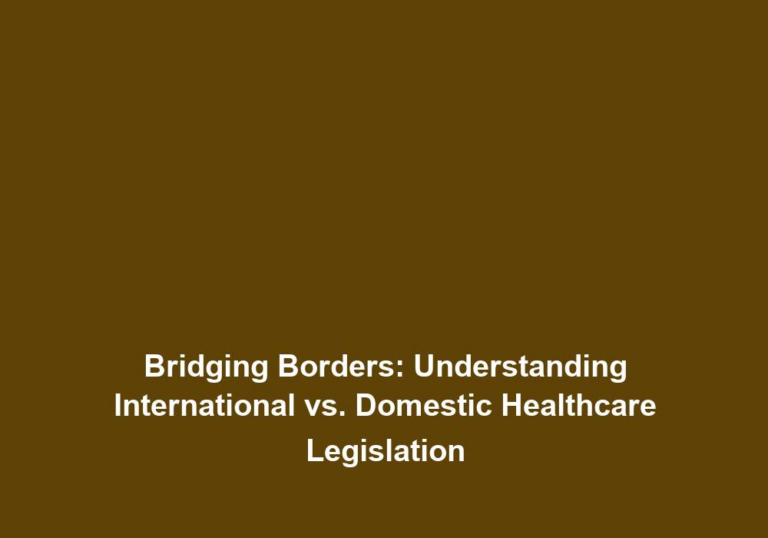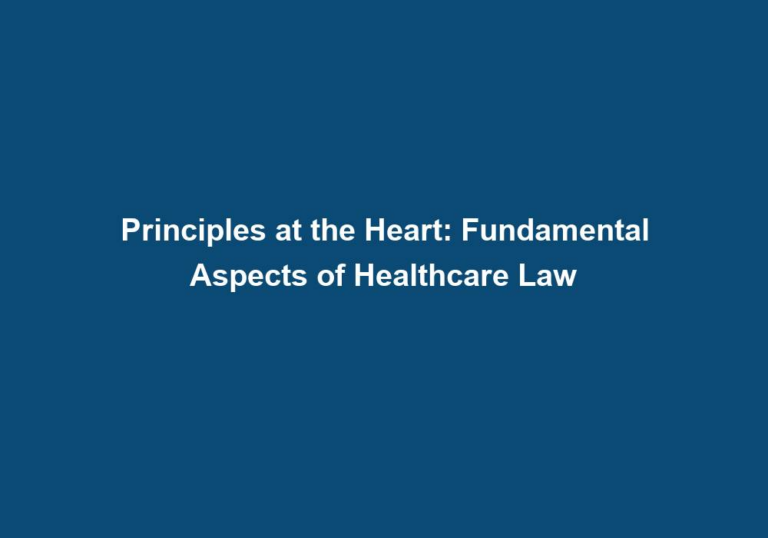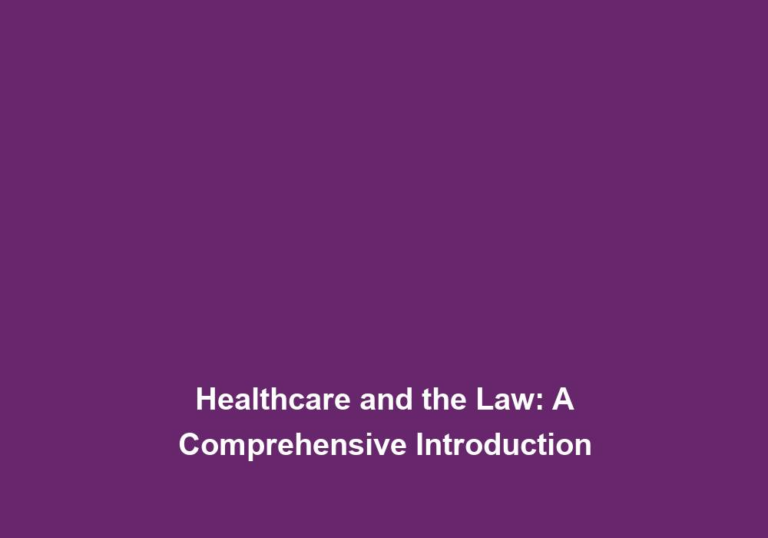The Cornerstones: Fundamental Principles of Healthcare Law
Healthcare law is a complex and ever-evolving field that regulates the provision of medical services, patient rights, and the relationship between healthcare providers and organizations. It encompasses a wide range of legal issues, including medical malpractice, patient confidentiality, insurance regulations, and healthcare fraud. Understanding the fundamental principles of healthcare law is crucial for healthcare professionals, patients, and policymakers alike. In this article, we will explore the key cornerstones that underpin healthcare law.
1. Consent and Patient Rights
One of the essential principles of healthcare law is the concept of informed consent. Patients have the right to make autonomous decisions about their medical treatment after being provided with complete and accurate information. Informed consent not only respects the patient’s autonomy but also forms the basis for respectful and ethical healthcare practices.
To ensure informed consent, healthcare professionals must provide patients with a comprehensive understanding of their condition, the available treatment options, associated risks, benefits, and alternatives. This involves effective communication and the use of layman’s terms to facilitate comprehension. It is crucial for healthcare providers to address any questions or concerns that patients may have, allowing them to make informed decisions about their healthcare.
Moreover, healthcare professionals must also consider the capacity of the patient to give informed consent. In cases where a patient lacks the capacity to make decisions, healthcare providers may need to involve the patient’s designated surrogate decision-maker or follow legal procedures to obtain consent.
2. Confidentiality and Privacy
Confidentiality is a cornerstone of healthcare law that protects patients’ private information. Healthcare providers are legally obliged to maintain the confidentiality of patient records, medical history, and any personal information shared during the course of treatment. Breach of confidentiality can result in legal consequences, loss of trust, and damage to the reputation of healthcare professionals or organizations.
To ensure the protection of patient information, healthcare providers must establish and enforce robust privacy policies and procedures. This includes secure storage and transmission of patient data, restricted access to medical records, and the use of encryption or anonymization techniques when sharing information electronically.
Privacy regulations, such as the Health Insurance Portability and Accountability Act (HIPAA) in the United States, further strengthen the protection of patient information. HIPAA sets standards for the privacy and security of health information, requiring healthcare providers to implement safeguards to prevent unauthorized access or disclosure.
In addition to legal obligations, maintaining patient confidentiality is also an ethical duty. Respecting patient privacy not only builds trust but also upholds the principles of autonomy and dignity in healthcare practice.
3. Medical Malpractice
Medical malpractice refers to the negligence or failure of healthcare providers to meet the accepted standard of care, resulting in harm to the patient. Healthcare professionals have a duty to provide competent and appropriate medical treatment. When a breach of this duty leads to injury or death, the affected patient or their family may seek legal recourse.
To establish a medical malpractice claim, several elements must be proven. First, it is necessary to establish the existence of a doctor-patient relationship, which creates a duty of care. Second, it must be shown that the healthcare provider deviated from the accepted standard of care, which is typically determined by expert testimony. Third, there must be a causal connection between the provider’s negligence and the patient’s injury or harm. Finally, the patient must have suffered damages as a result of the negligence.
Medical malpractice cases often involve complex legal and medical issues, requiring extensive investigation, expert testimony, and analysis of medical records. It is crucial for both plaintiffs and defendants to seek legal representation with expertise in medical malpractice to navigate these intricate cases effectively.
4. Healthcare Fraud and Abuse
Healthcare fraud and abuse involve intentionally deceiving or misrepresenting information to gain unauthorized benefits, such as financial gain or obtaining prescription medications illegally. Examples of healthcare fraud include submitting false claims to insurance companies, kickbacks for patient referrals, or billing for services that were not provided.
To combat fraud and abuse, governments enact laws and regulations that impose penalties, fines, and even criminal charges. The False Claims Act in the United States, for example, allows individuals to file lawsuits on behalf of the government against those who have defrauded federal healthcare programs. Whistleblower protections are also in place to encourage individuals with knowledge of fraud to come forward.
Healthcare organizations and providers must establish robust compliance programs to prevent and detect fraud and abuse. This includes implementing internal controls, conducting regular audits, and providing education and training to employees on ethical billing practices. Compliance with anti-fraud laws not only ensures legal adherence but also helps protect the integrity of the healthcare system.
5. Healthcare Regulations and Compliance
Healthcare law encompasses a wide range of regulations and compliance requirements. These include licensing and certification of healthcare professionals and facilities, standards for patient care, quality control measures, and the regulation of pharmaceuticals and medical devices.
Compliance with healthcare regulations is essential to ensure the safety and well-being of patients, maintain the integrity of healthcare systems, and promote public trust. Healthcare providers must stay updated with the evolving regulatory landscape and make necessary adjustments to their practices to remain in compliance.
Regulatory bodies, such as the Food and Drug Administration (FDA) in the United States, play a crucial role in overseeing the safety and efficacy of pharmaceuticals and medical devices. They establish guidelines and requirements for manufacturers, conduct inspections, and enforce compliance to protect public health.
Healthcare organizations should establish a culture of compliance and appoint compliance officers responsible for monitoring and enforcing adherence to regulations. Regular training programs and internal audits can help identify areas of non-compliance and prompt corrective actions.
6. Ethical Considerations
Ethics play a crucial role in healthcare law, guiding the conduct of healthcare professionals and organizations. Ethical principles, such as beneficence (doing good), non-maleficence (avoiding harm), autonomy (respecting patient’s decisions), and justice (fair distribution of resources), provide a framework for ethical decision-making in healthcare.
Respecting these principles helps to uphold the rights and dignity of patients, foster trust, and maintain the integrity of the healthcare profession. Healthcare providers must navigate complex ethical dilemmas, such as end-of-life care, resource allocation, and conflicts of interest, while prioritizing patient well-being.
Ethics committees within healthcare organizations can provide guidance and support in addressing ethical challenges. These committees, comprising professionals from various disciplines, review cases, provide recommendations, and ensure ethical standards are upheld.
Ultimately, ethical considerations go beyond legal requirements, serving as a moral compass for healthcare professionals in their daily practice.
7. Health Insurance and Affordable Care
Health insurance is an integral part of the healthcare system, providing financial protection against the high costs of medical treatment. Healthcare laws regulate the insurance industry, ensuring that insurance companies adhere to fair practices, provide coverage to those in need, and prevent discrimination based on pre-existing conditions.
The concept of affordable care aims to make healthcare accessible and affordable to all individuals, regardless of their socioeconomic status. Healthcare laws, such as the Affordable Care Act in the United States, have been enacted to increase access to healthcare, expand insurance coverage, and establish marketplaces for individuals to compare and purchase health insurance plans.
Healthcare providers must be knowledgeable about health insurance regulations to navigate the complexities of billing, reimbursement, and coverage. They should also be prepared to assist patients in understanding their insurance benefits and connecting them with appropriate resources.
Conclusion
Understanding the fundamental principles of healthcare law is essential for both healthcare professionals and patients. Consent, confidentiality, medical malpractice, healthcare fraud, compliance, ethics, and health insurance are some of the cornerstones that shape the legal landscape of the healthcare industry.
By adhering to these principles, healthcare providers can uphold patient rights, deliver quality care, and contribute to a just and ethical healthcare system. Similarly, patients can make informed decisions, trust their healthcare providers, and receive the care they deserve.
As healthcare law continues to evolve, it is vital to stay informed and aware of the legal framework that governs the healthcare profession. By doing so, healthcare professionals can adapt to changes, advocate for necessary reforms, and ensure the delivery of safe and effective healthcare services.

